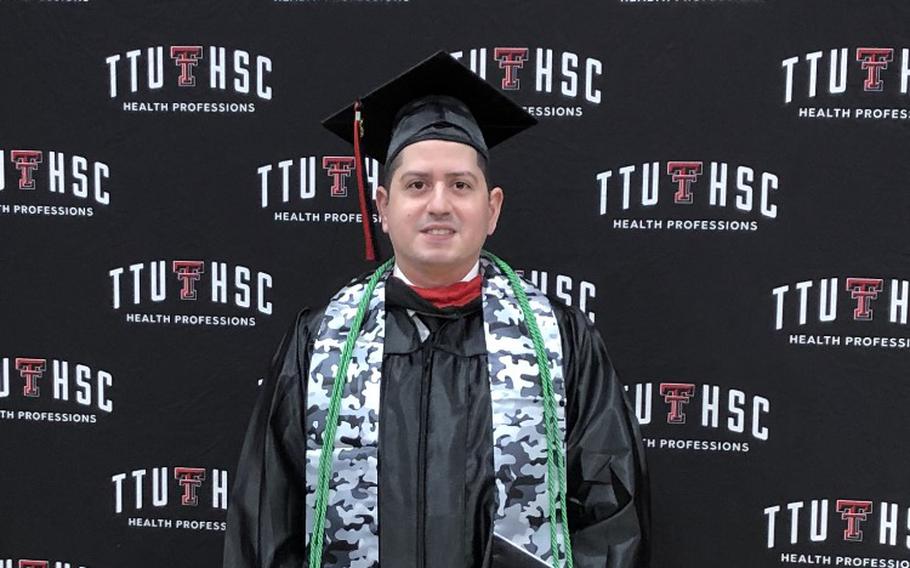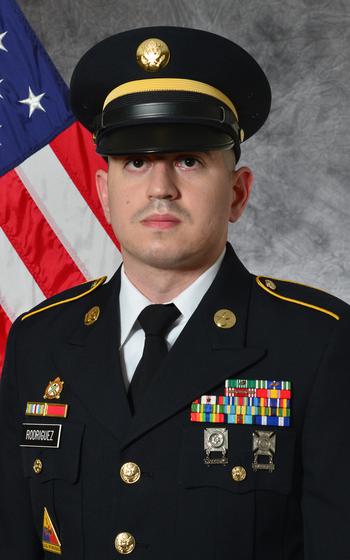Military Life
Finding success in the struggle
Stripes Europe June 18, 2024

Rodriguez’s graduation photo (provided by Rodriguez)
My name is Sergeant (Ret.) Christopher Rodriguez. I am a medically retired Army Sergeant with service all over the world including a combat tour in Afghanistan.
Like many others, I envisioned a military career that would last at least 20 years. As a young Sergeant with only five years of service in mid-2016 I had my “military resume” well-crafted. My military career was on the rise with two tours in the middle east, a yearlong tour in South Korea, 13 ribbons and other devices on my Army Service Uniform (ASU), and I bumped my GT score to a 125. My career was ready to go anywhere. I felt on top of the world.
That changed a few days before my birthday in late 2016 when I suffered a major injury. Over the next two years, I went through surgery, physical rehabilitation learning how to walk again post-surgery, and a sudden medical evaluation board (MEB) that led to my quick medical retirement. It only took four months, with little time to prepare, to be discharged from the Army.
I was out of the military with little guidance. Initially during my rehabilitation process, I was still planning to stay in the Army and did my best to get better. Then the MEB process came. My medical discharge was fast, and I ended up not having enough time to start my new chapter.
This is where Veterans can fall in the danger zone, which we know could be contributing to the veteran suicide crisis. Initially, I struggled to find a new calling after the military. I found that other Veterans did as well. In the military, many service members are unaware (like I was) that there can be success after service.

Active duty portrait for Rodriguez (provided by Rodriguez )
In my experience, it felt as though medically retired Veterans were rushed out the door. My plans can no longer include a 20-year career, and I was forced to restart a new life with almost no preparation. The situation can easily lead to mental health challenges. My story is similar to that of many Veterans who were medically separated or retired, often with no college education and no plans for the next chapter. Often, Veterans in this category are not a focus for military transition programs. They lose out on many opportunities such as the DOD SkillBridge Program, internships and more. An added challenge is the income limitation placed by the DoD to take either retirement pay or VA disability compensation.
But I encourage other Veterans to find success in the struggle. I took full advantage of the GI Bill and knocked out some degrees by earning a Bachelor of Arts in Organizational Leadership and a Master of Science in Healthcare Administration. I am currently working toward a Doctor in Business Administration (DBA) degree. I also found my determination to hit the workforce again. This was the hardest part; I would say harder than my combat tour in Afghanistan because I had little preparation or guidance. I have now worked for five years in my new healthcare administration career. I found my new purpose to serve others at The University of Texas MD Anderson Cancer Center.
Many Veterans who are medically discharged are unaware of the challenges they will face when first getting out. I know from my experience how hard it is to start something new after such a sudden end to a growing military career, but there is always something out there. What helped me was taking advantage of Veteran-friendly employers and resources. Many businesses have Veteran employee networks (groups) that are happy to help. Additionally, there are many organizations specifically aimed at assisting Veterans in their search for employment. For example, the VA, U.S. Vets and the Texas Veterans Commission for those in Texas. There are likely similar programs in other states.
Connecting with former military members that I served with, and non-military friends helped me thrive. Some were empathetic of situation and wrote letters of recommendations for university applications and job references. It was also helpful to take advantage of resources such as the GI Bill.
In the end, it took finding my own determination to get back into the workforce. I took a chance and started working at an entry level position in a large, university medical center. It got my foot in the door. With networking and guidance from the employee network and fellow Veterans, I moved up and now have a career with future potential growth.
I encourage military Veterans who find themselves suddenly medically discharged to use the resources available and seek help when you need it. The struggle is real, but you can still find success outside of the military.

Rodriguez’s graduation photo (provided by Rodriguez)